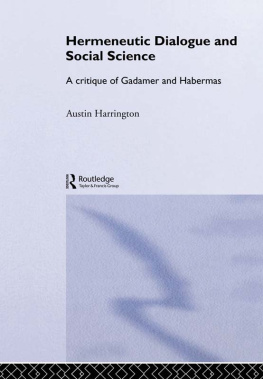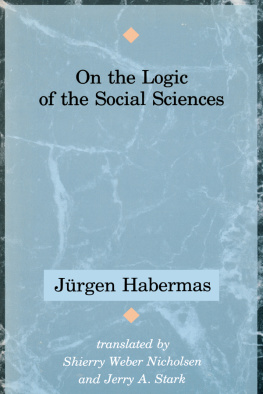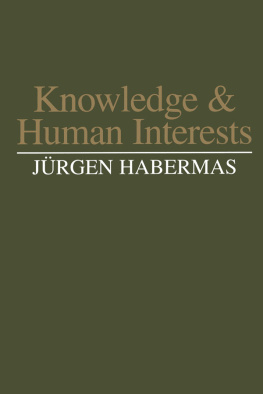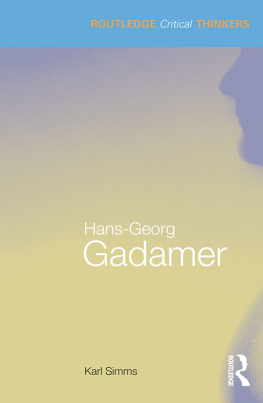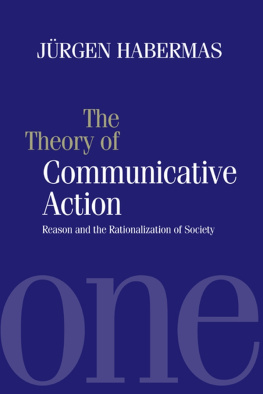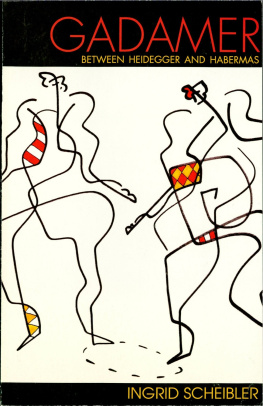Hermeneutic Dialogue and Social Science
The German philosophers Gadamer and Habermas share an idea of the process of understanding as a dialogue between the researchers of other cultures and the subjects whose lives and actions they study. This book offers a new challenge to their central argument. While previous studies of these philosophers have tended to concentrate on the differences between their two standpoints, this work questions the validity of the basic thesis they hold in common by critically re-examining their views of earlier figures in the German hermeneutic tradition. The book includes:
- examinations of the philosophers' responses to theorists from Wilhelm Dilthey to Max Weber and Alfred Schtz
- concise contextual information, including an account of debates over objectivity in social science from the Enlightenment to Durkheim, Weber and the Frankfurt School
- clear, detailed definitions of critical terms, including objectivity, positivism, empathy and verstehen
- a concluding assessment of the scope and limits of the idea of dialogical social science.
Hermeneutics has become an increasingly popular area of study at undergraduate, graduate and post-graduate levels across a variety of related disciplines. This book, aimed primarily at sociologists, provides an in-depth, comprehensive and contextual treatment of this subject, and it will be of interest not only to social scientists but also to those pursuing research in philosophy or the history of ideas.
Austin Harrington is Lecturer at the Department of Sociology and Social Policy at the University of Leeds. His work on hermeneutics and social theory in the writings of Gadamer, Habermas, Dilthey, Weber and Schtz has also appeared in the journals Philosophy of the Social Sciences, Journal for the Theory of Social Behaviour, Theory and Psychology, Max Weber Studies and Sociology.
Routledge Studies in Social and Political Thought
| 1 | Hayek and After |
| Hayekian liberalism as a research programme |
| Jeremy Shearmur |
| 2 | Conflicts in Social Science |
| Edited by Anton van Harskamp |
| 3 | Political Thought of Andr Gorz |
| Adrian Little |
| 4 | Corruption, Capitalism and Democracy |
| John Girling |
| 5 | Freedom and Culture in Western Society |
| Hans Blokland |
| 6 | Freedom in Economics |
| New perspectives in normative analysis |
| Edited by Jean-Francois Laslier, Marc Fleurbaey, Nicolas Gravel and Alain Trannoy |
| 7 | Against Politics |
| On government, anarchy and order |
| Anthony de Jasay |
| 8 | Max Weber and Michel Foucault |
| Parallel life works |
| Arpad Szakolczai |
| 9 | The Political Economy of Civil Society and Human Rights |
| G. B. Madison |
| 10 | On Durkheims Elementary Forms of Religious Life |
| Edited by W. S. F. Pickering, W. Watts Miller and N. J. Allen |
| 11 | Classical Individualism |
| The supreme importance of each human being |
| Tibor R. Machan |
| 12 | The Age of Reasons |
| Quixotism, sentimentalism and political economy in eighteenth-century Britain |
| Wendy Motooka |
| 13 | Individualism in Modern Thought |
| From Adam Smith to Hayek |
| Lorenzo Infantino |
| 14 | Property and Power in Social Theory |
| A study in intellectual rivalry |
| Dick Pels |
| 15 | Wittgenstein and the Idea of a Critical Social Theory |
| A critique of Giddens, Habermas and Bhaskar |
| Nigel Pleasants |
| 16 | Marxism and Human Nature |
| Sean Sayers |
| 17 | Goffman and Social Organization |
| Studies in a sociological legacy |
| Edited by Greg Smith |
| 18 | Situating Hayek |
| Phenomenology and the neo-liberal project |
| Mark J. Smith |
| 19 | The Reading of Theoretical Texts |
| Peter Ekegren |
| 20 | The Nature of Capital |
| Marx after Foucault |
| Richard Marsden |
| 21 | The Age of Chance |
| Gambling in western culture |
| Gerda Reith |
| 22 | Reflexive Historical Sociology |
| Arpad Szakolczai |
| 23 | Durkheim and Representations |
| Edited by W. S. F. Pickering |
| 24 | The Social and Political Thought of Noam Chomsky |
| Alison Edgley |
| 25 | Hayeks Liberalism and Its Origins |
| His idea of spontaneous order and the Scottish Enlightenment |
| Christina Petsoulas |
| 26 | Metaphor and the Dynamics of Knowledge |
| Sabine Maasen and Peter Weingart |
| 27 | Living with Markets |
| Jeremy Shearmur |
| 28 | Durkheims Suicide |
| A century of research and debate |
| Edited by W. S. F. Pickering and Geoffrey Walford |
| 29 | Post-Marxism |
| An intellectual history |
| Stuart Sim |
| 30 | The Intellectual as Stranger |
| Studies in spokespersonship |
| Dick Pels |
| 31 | Hermeneutic Dialogue and Social Science |
| A critique of Gadamer and Habermas |
| Austin Harrington |
| 32 | A History and Meaning of Methodological Individualism |
| Lars Udehn |
| 33 | John Stuart Mill and Freedom of Expression |
| The genesis of a theory |
| K. C. ORourke |
Hermeneutic Dialogue and Social Science
A critique of Gadamer and Habermas
Austin Harrington
London and New York
First published 2001
by Routledge
2 Park Square, Milton Park, Abingdon, Oxon, OX14 4RN
Simultaneously published in the USA and Canada
by Routledge
270 Madison Ave, New York NY 10016
Routledge is an imprint of the Taylor & Francis Group
Transferred to Digital Printing 2005
2001 Austin Harrington
Typeset in Garamond by Curran Publishing Services Ltd
All rights reserved. No part of this book may be reprinted or reproduced or utilised in any form or by any electronic, mechanical, or other means, now known or hereafter invented, including photocopying and recording, or in any information storage or retrieval system, without permission in writing from the publishers.
British Library Cataloguing in Publication Data
A catalogue record for this book is available from the British Library
Library of Congress Cataloging in Publication Data
Harrington, Austin 1970
Hermeneutic dialogue and social science: a critique of Gadamer and Habermas / Austin Harrington.
p. cm
Includes bibliographical references and index.

